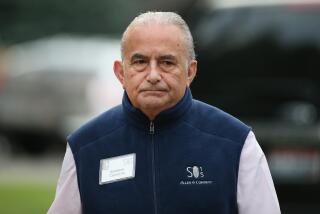Venezuelan TV shows will make it in Hollywood, a firm hopes
Migration has always been crucial to the success of the Phelps family of Venezuela.
The study of bird migration led William Henry Phelps, a Harvard student, to South America in 1896. The ornithologist would go on to become one of Venezuela’s most prominent businessmen, launching Radio Caracas, one of the country’s first radio stations, in 1930 and Radio Caracas Television, its first privately owned television station, 23 years later. But four years ago, the Venezuelan government knocked the family-owned broadcast TV station off the air, accusing it of plotting against President Hugo Chavez and participating in a coup attempt.
And last year, the administration pulled the plug on the company’s cable channel after it refused to carry Chavez’s speeches, leaving Radio Caracas TV without a television audience in its homeland.
Now the founder’s 30-year-old great-great grandson, Jorge Granier Phelps, is working to help his family’s media company migrate again — this time to Hollywood and the Internet.
“The shutdown impacted us profoundly,” Granier Phelps — the boyish-looking managing director of RCTV International, the company’s Miami-based foreign sales operation — said during a recent interview in his publicist’s trendy Santa Monica office suite.
“It was very dramatic and very traumatic, not only for the business but also mentally and emotionally because our family built this company through more than 57 years,” he said. “RCTV International was left to figure out how to leverage the assets that we have and make them profitable so we could carry the business through this difficult time as we reinvent ourselves.”
Parent company Radio Caracas Television is staking its future on its past. Headquartered in Caracas, Venezuela’s capital, and managed by Granier Phelps’ 70-year-old father, Marcel Granier, the media company continues to operate two radio stations, a television production facility, a record company and music stores in Venezuela.
This month, a bounty of RCTV’s Spanish-language programming, including 10 popular soap operas, or telenovelas, will become available through the online video service Hulu. RCTV’s shows, which also include documentaries and features, will be part of the Hulu Latino offering. RCTV also licensed more than 1,300 hours of programming to Netflix Inc. for its Latin American subscription service, which launched in September.
“RCTV’s strategy is to try to become an international television force,” said Miguel Tinker Salas, a Latin American history professor at Pomona College in Claremont. “They would like to expand out of Venezuela and into Latin America and the U.S. Latino market.”
Granier Phelps plans to open an office in Los Angeles this year. Over the last few months, he and an American partner have been sifting through RCTV’s archives to identify material that could be adapted into English-language dramas and comedies that could run in the U.S.
The company’s push into Hollywood comes as TV executives take a closer look at hugely popular prime-time dramas from Latin America, which run five nights a week with over-the-top story lines about love, betrayal and empowerment. Telenovelas that air on Univision, the top-rated U.S. Spanish-language network, often draw larger audiences than shows on NBC and leading cable channels.
Executives would like to find the next “Yo Soy Betty, la Fea,” the Colombian telenovela that became a global phenomenon and inspired “Ugly Betty,” a modest hit on ABC. Other imports that have been adapted include the British comedy “The Office” and the Israeli dramas that became “In Treatment” and “Homeland.”
“We have many stories that have been successful around the world,” Granier Phelps said. “So why not take those stories and retell them for the modern times?”
Gary Pearl, a former talent agent at William Morris Agency and International Creative Management, has teamed up with Granier Phelps. They identified eight RCTV telenovelas, including “Mi Prima Ciela” (My Cousin Ciela) and “Te Tengo en Salsa” (also called “Recipe for Love”), to modify for English-language audiences and shop to U.S. broadcast networks and cable channels.
“This library has been underutilized in the American market,” Pearl said. “There are 130 hours for each of these shows, and they balance lots of different subjects and social issues in a commercial way.”
RCTV has been selling its Spanish-language shows overseas since the early 1980s, when it launched its international distribution arm. RCTV shows have played in 120 countries and have been dubbed into English, Portuguese, French, Hebrew, Mandarin, Russian and Turkish.
The company, one of two major telenovela suppliers in Venezuela, was known in Spanish-language TV circles for its high production values and rich storytelling.
“Venezuela, in the 1980s, was generating $500 million a year through the export of telenovelas,” Tinker Salas said. “But the company ultimately lost ground to the Colombians [and] Brazilians as it became more politically strident and the competition increased.”
In recent years, RCTV’s international standing was eclipsed by TV companies in Colombia and Mexico. According to industry executives, those producers more successfully tailored their telenovelas for foreign audiences by eliminating regional details and emphasizing universal themes.
“But the station had a historic role,” Tinker Salas said. “It put its stamp on an entire generation of Venezuelans.”
When RCTV lost its broadcast license in the politically polarized country, the company — which had been a vibrant hub of TV production — retrenched and laid off many of its 3,000 employees. It now has a staff of nearly 500.
“At the time, RCTV was the biggest television station in Venezuela,” said Abdel Guerere, an economist, author and media analyst in Venezuela. “They had the largest audience, the greatest share, but the government said, ‘no more, shut it down.’”
The Phelps family isn’t ready to surrender.
“There are two main points of focus for our company right now,” Granier Phelps said. “For my father in Venezuela, the goal is outlast the Chavez government and return to the air and to the homes of the Venezuelan families where we belong.
“And my goal is to make us independent of what goes on in Venezuela. We must become a worldwide content company, and the place to do that is here in the U.S.”







